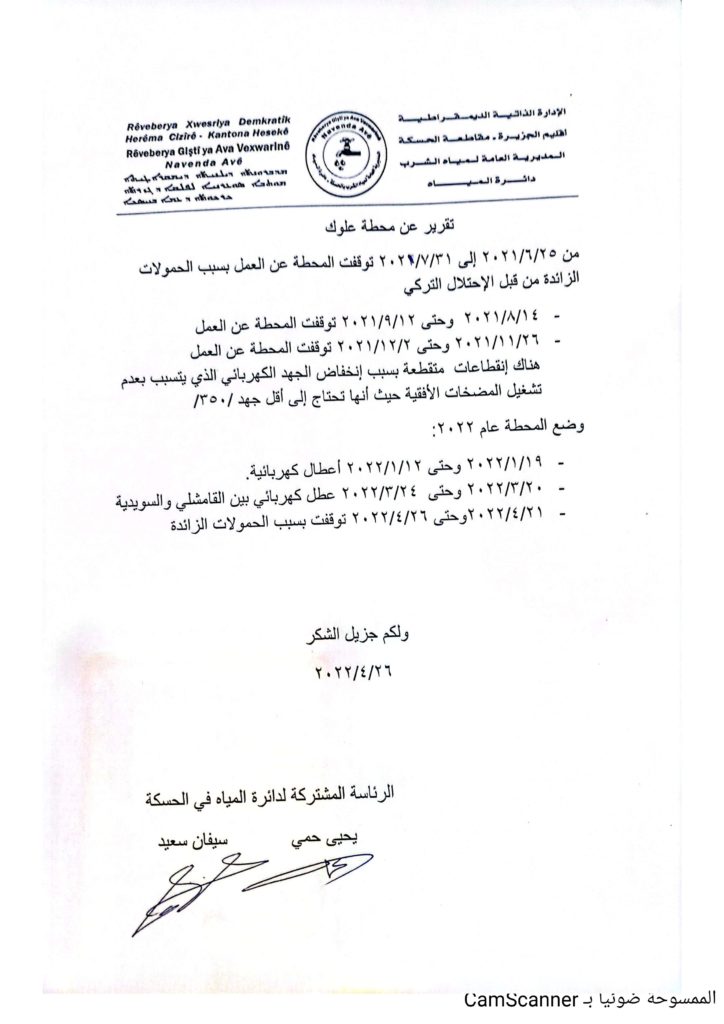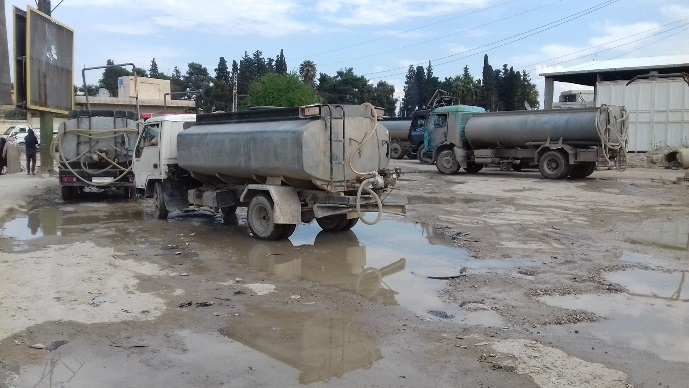متوفر باللغة العربية أيضاً
Bi Kurdî jî peyda dibe
Kaniwar Mizher
This publication was produced with the financial support of the European Union. Its contents are the sole responsibility of Kaniwar Mizher who prepared this material in the favor of the partnership between Nextep Organization and Welat FM and do not necessarily reflect the views of the European Union.
Along the road to his new residence, Lawand comes across water-filled potholes daily, the water which was the main reason for his displacement from his hometown of Hasakah. This scene was unusual for him before moving to the city of Qamishli but now reminds him of the suffering that forced him to be internally displaced.
Speaking to Welat Fm about the reasons for his displacement from Hasakeh seven months ago, Lawend Daweh 33 had a sigh before saying: “I did not want to leave Hasaka. I’m closely attached to this city. But I had to leave due to the bad living and service circumstances, particularly the water.”
“The shortage of water, its repeatedly and long-time cut and the contamination of the water tankers’ water which we relied on as an alternative supplying our needs, in addition to the lack of services in other sectors were the main reasons for my displacement,” added Lawend.
Perhaps the main reason behind his moving to Qamishli was his and his wife’s fear of their child being infected with a bacterial infection as they were using contaminated water, which forced him to purchase mineral water for his family, particularly for his mother, who suffers from kidney disease, which increased his financial burden, according to him.
Seeking to secure his water needs, Lawend, like other townspeople, resorted to purchasing water from tankers. However, those tankers have been previously used for petroleum products transportation, and the contamination of alternative water sources has increased, posing a real threat to his health and his family’s.
As a result of their use of this water, many diseases spread among the city’s inhabitants, especially among children. Local media reported that, during each day of June 2021, the People’s Hospital in Hasaka received one hundred cases of poisoning, infections, and symptoms of diarrhea, amid high temperatures, due to using unsecure water sources.
Since August 2020, the people of Hasakah have been suffering from a water crisis as, in October 2019, the Syrian pro-Turkish factions controlled Alouk station located in the city of Serê kaniyê / Ras Alain, which is the prime source of drinking water for Hasaka city and its countryside.
Human Rights Watch Organization accused Turkey of deliberately harming the civilian population in the eastern Euphrates, cutting drinking water off them, which threatened to increase the coronavirus outbreak. Turkey denies the related accusations, saying that Alouk station is powered by electric power generated from the Tishreen Dam, which is under the control of the Autonomous Administration, which, according to Turkey, has been cutting the power frequently and intentionally since November 2019.
Obtaining water from tankers was not that easy either because one has to make the appointment in advance and make dozens of attempts to get one water tanker, according to Lawend.
Lawend added that the water crisis is “stressful” due to the irregular timing of pumping water from Alouk station, which keeps him waiting to obtain enough water. More stressing is that the water is often pumped in the dawn hours, coinciding with the power cut-off; If he can’t secure the water at this time, then he will have to wait another week or seek to purchase water from tankers.
This water crisis prompted Lawand and many of the townspeople to leave it, heading to villages and cities where there are better conditions regarding water. They escape suffering that is draining and paralyzing their lives.
As an alternative emergency solution to supply water, the General Water Directorate of the Autonomous Administration launched several projects to draw water to Hasaka, at the beginning of last year, including a project to draw water from the Euphrates River in the countryside of Deir Ezzor.
According to a statement issued by the Water Directorate, the project aims to draw Euphrates water from the Siwar station in eastern Deir Ezzor to the Shadadi station in the Hasaka countryside and pump it to the water station in the 47 Area, from there into Hasakah.
Officials of the Autonomous Administration stated to the media that the project is to cover about 20% of the water needs of Hasaka. It is not a substitute for the Alouk station. However, it comes as a solution to reduce the water crisis.
The situation is no different for Shinda Hussein, 38, who moved with her family from Hasaka to Amuda after the water crisis was exaggerated there. However, they have returned to Hasaka after only one month because of her father’s strong attachment to their neighborhood of origin and his inability to adapt to another place; Shinda will face the water crisis once again.
However, the obsession of relocating or even emigration from the country still haunted Shinda and other townspeople. As a result of the water crisis, many families have been dispersed. Some individuals separated from their families, or close friends, as happened with Shinda. Her uncle and one close friend moved to the city of Qamishli as they couldn’t adapt to the water crisis in Hasaka.

While speaking to Welat FM via WhatsApp, Shinda gulped back her tears and said: “It is a painful feeling when a water crisis causes a family member, or a close friend, to move away; My father is sad about my uncle’s displacement to Qamishli, and I really miss my best friend.”
Awaiting and alertness with every pumping of water
Shinda narrates the condition of her neighborhood at the times before water is pumped “When it is our neighborhood turn of water pumping, we suspend all our work waiting for the moment the water arrives. A state of alert prevails among the residents, young and old, as soon as the water is pumped. Others take the initiative to inform each other via social media.
Social relations have not been exempt from the impact of the water crisis. Shinda explained that they sometimes have to apologize for performing social duties when it coincides with the time of the water pumping to the neighborhood so they wouldn’t have to wait another week for the upcoming pumping process. And the water crisis causes them embarrassment when overnight visitors come from outside due to the lack of water in their houses.
The water crisis may also cause problems at the family level, as happened with Shinda’s father and mother. Shinda pointed out that disputes occurred between her parents due to the continuing water crisis in the city. All these affect Shinda’s psychological state and prompt her to think about relocating daily.
For Lawend and Shinda, the solutions applied by the Autonomous Administration were insufficient as they were temporary and emergency solutions that did not contribute to fully resolving the water crisis. They called on the Autonomous Administration to find radical and long-term solutions such as going through a serious cooperation with humanitarian organizations operating in the region to launch projects aiming to end the water crisis in Hasaka and its countryside, and to reach a formula that would neutralize Alouk’s station from political conflicts.

